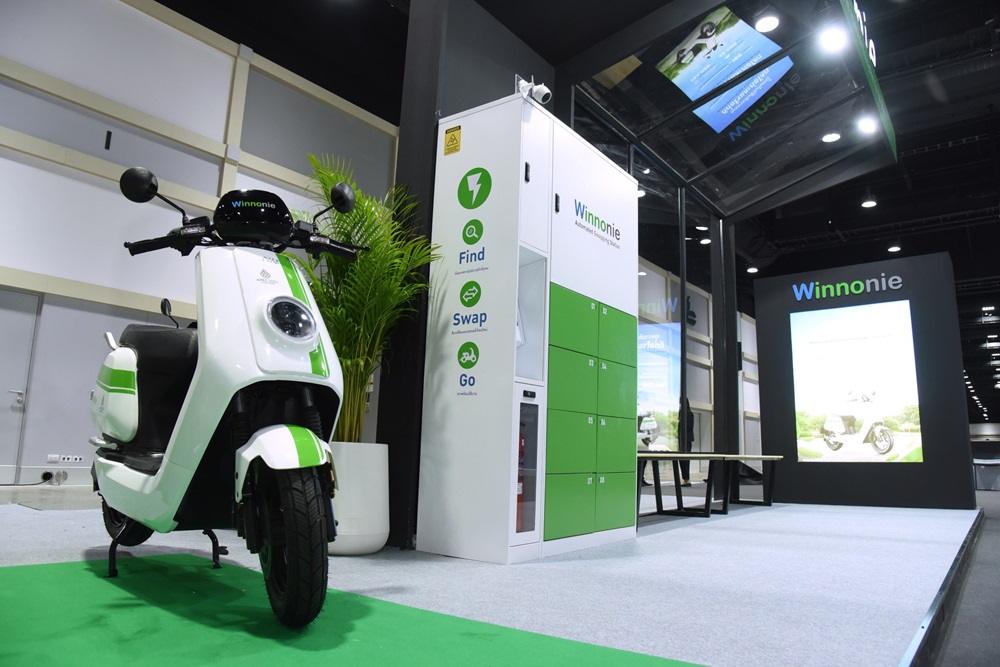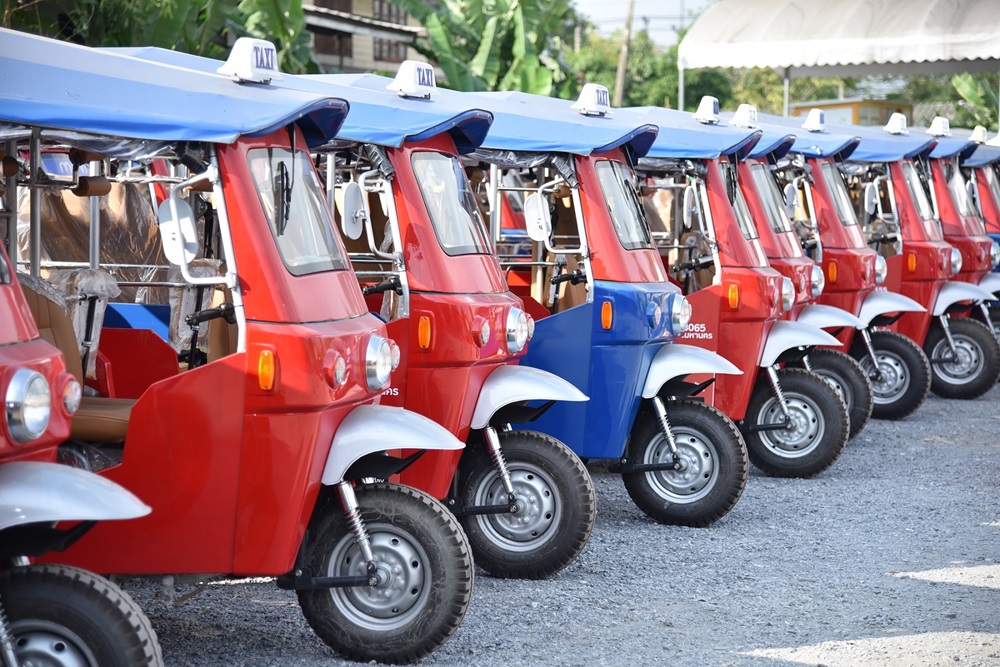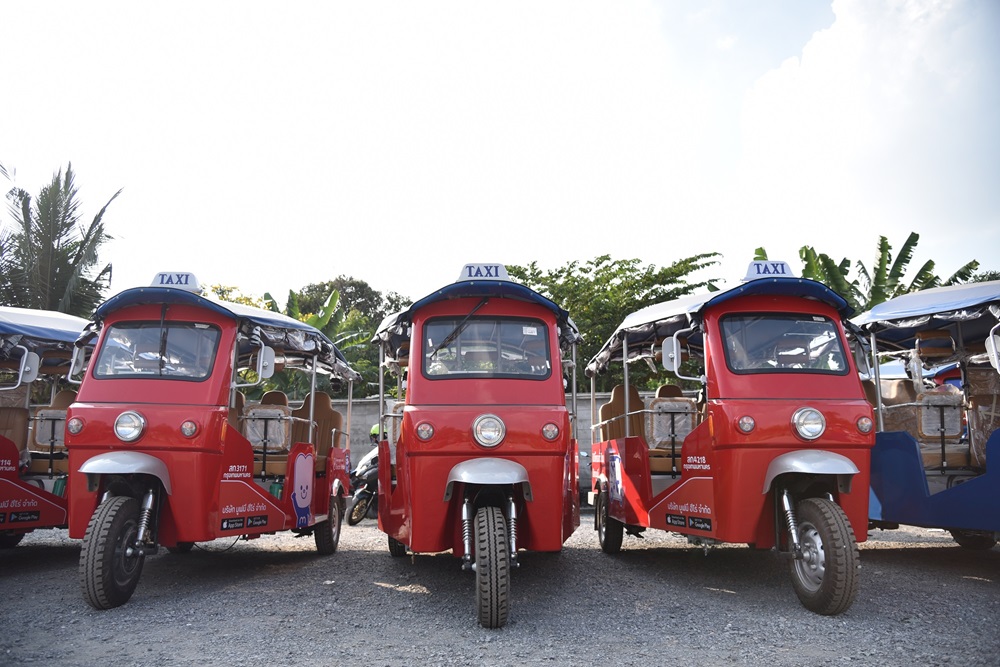Business
National Innovation Agency (NIA) Highlights Electric Vehicles Manufactured in Thailand

Motorcycle taxi, tuk-tuk, and golf cart management platforms represent three technologies propelling the industry, opening the door for Thailand to emerge as a regional hub for electric vehicles.
This year, the spotlight is firmly on “electric vehicles” or EVs, evident in the notable increase in reservations compared to preceding years. This upsurge reflects a growing global trend of individuals prioritizing environmental consciousness in their lifestyles. Additionally, there is an observable era marked by the shift away from fossil energy toward new alternative energy sources.
This megatrend is exemplified by the continuous growth in global EV sales, escalating from 3.1 million vehicles in 2020 to 6.5 million in 2021, further reaching 10.2 million in 2022, and exceeding 14 million in 2023. It marks a historic milestone as electric vehicles, spearheaded by pioneering technology developer “Tesla,” emerge as the most valuable automotive brand globally.
Thailand is also actively participating in this trend. Recent findings reveal a remarkable surge in electric car registrations, soaring from 570 cars in 2019 to over 66,000 cars in 2023. Notably, at a recent well-known automobile expo, there were a staggering 53,248 car reservations, with more than 20,400 of them being for EVs.

Becoming an “EV production center” is a new opportunity that Thailand must swiftly capitalize on.
Today, the National Innovation Agency (Public Organization), or NIA, invites you to explore the growth prospects of the innovative electric vehicle industry in Thailand. Initial data indicates that Thailand stands as a pivotal global hub for automobile production. Consequently, the government has established an ambitious goal to position Thailand as a key production center for electric vehicles and automotive parts in the Asian region.
Furthermore, the government has established an objective to manufacture zero emission vehicles (ZEVs), which are vehicles emitting no emissions. By 2030, the target is for zero-emission cars to constitute 30 percent of the overall car production. This commitment is embedded in the long-term planning outlined in the 13th National Economic and Social Development Plan.
The plan extends beyond merely encouraging electric car production and usage; it also emphasizes the comprehensive preparation of the ecosystem for electric vehicles, focusing on promoting and advancing innovations related to electric vehicle technology.
Capitalizing on the opportunities and growth potential within the electric vehicle industry and its related technology, NIA has designated it as a key sector within the economic innovation project eligible for funding. Through the “Mandatory Innovation Business Platform,” innovators in this field receive support in the form of grant funding, with a cap of 5 million baht per project.
This funding encompasses various aspects such as market testing, product enhancements, standard testing, and the scaling of innovations toward commercialization. The support and acceptance of project proposals in the previous year revealed significant interest from over 100 innovation-based entrepreneurs seeking assistance.
NIA is actively prepared to facilitate the creation of opportunities and establish connections with related markets, including tourism, transportation, and industries associated with electric vehicles. This underscores the comprehensive readiness and progress of these industries, extending beyond the passenger car sector.

Winnonie – a motorcycle taxi service startup aimed at saving the world, expressing the essence of the new era’s motorcycle taxis that are committed to human and global well-being.
Winnonie stands as the pioneering startup in Thailand, introducing an innovative platform for electric motorcycle taxis along with a network of automated battery exchange stations. This groundbreaking initiative aims to enhance the quality of life for motorcycle taxi drivers by reducing occupational expenses. Concurrently, it tackles the necessity of promoting clean energy and actively contributes to the reduction of air pollution.
Winnonie emerged in response to the challenges faced by motorcycle taxi drivers burdened with high occupational expenses, with over 60 percent attributed to vehicle installments and petrol costs. To alleviate this financial strain and enhance income, Winnonie introduced a groundbreaking platform that offers electric motorcycle (E-Motorbike) rental services.
This initiative comprises three key technological components. Firstly, it involves the utilization of imported electric motorcycles with an engine size equivalent to a 125-cc petrol vehicle. These motorcycles are equipped with two batteries, providing a range of 80 to 100 kilometers and a maximum speed of 80 kilometers per hour.
Secondly, the initiative includes ready-to-use batteries and a network of battery change stations. Thirdly, a dedicated application is introduced, offering monthly rental rates starting at 4,200 baht or approximately 140 baht per day. This monthly fee covers maintenance service charges and includes access to the Automatic Battery Swapping Station service.
This eliminates the need for drivers to wait for charging and enables them to swiftly replace the battery within two minutes, resulting in a reduction of overall costs by more than 50 percent.
Since its inception, Winnonie has served over 1,000 users with its electric motorcycle platform and battery-swapping services. The ambitious plan includes expanding with an anticipated 120 battery-swapping stations covering Bangkok and its environs by the end of 2023.
Looking ahead, the goal is to capture a 10 percent market share by 2026, focusing on the extensive community of motorcycle taxi drivers and riders, totaling up to 500,000 units. Additionally, the target extends to the broader population of motorcycle users, which totals approximately 4 million units in Bangkok.
If successful as intended, the project has the potential to significantly curb carbon dioxide emissions, combat global warming, and alleviate noise pollution. This aligns with both the environmental imperatives of the net-zero policy and the economic dimensions outlined in the BCG framework.
In doing so, it could foster GDP growth through increased employment opportunities and the advancement of innovation, encompassing the production of battery swapping stations, associated software, and many others.
These developments might extend to the production of electric motorcycles and batteries in the future. They also have the potential to enhance social aspects and overall quality of life, empowering motorcycle taxi drivers to maintain stable expenses, increase income, and adopt new technology that improves their quality of life.

“MuvMi” represents the transformation of Thailand’s soft power icon “Tuk Tuk” into a vehicle designed to travel and share positive experiences with fellow travelers.
MuvMi, a Thai electric tuk-tuk, is a volunteering initiative designed to alleviate traffic congestion through cutting-edge innovation and a ride-sharing system. It introduces new travel options for residents of Bangkok that are not only economical but also safe, environmentally friendly, and free from pollution. Beyond its practical benefits, MuvMi aims to enhance Thailand’s “soft power” image, leaving a positive impression on foreigners.
MuvMi represents a public transportation service in the form of “electric tuk-tuk,” offering the distinct advantage of being compact and small. Its nimble design enables it to navigate through narrow alleys with ease, facilitating the efficient transport of multiple passengers on each trip.
Therefore, MuvMi has evolved into an innovative electric tuk-tuk with a distinctive appearance, departing from the traditional design. Sporting a modern, airy, and comfortable aesthetic, it boasts a quiet operation, a robust structure, and a low center of gravity, minimizing the risk of overturning and ensuring high safety standards. Powered by electricity, it eliminates concerns related to odors, loud noises, and environmental pollution.
Additionally, MuvMi offers the added convenience of a dedicated ‘MuvMi’ application, enhancing the experience for both drivers and passengers. The app provides essential information about travel routes, battery levels, and locations of charging stations.
Users can easily request a ride through the app, and fares are calculated based on the actual distance traveled. This feature addresses issues such as unpredictable fare prices, the potential for overcharging, and challenges in negotiation, particularly for foreign tourists who may not speak Thai.
Moreover, MuvMi features a ride-sharing system that allows passengers to opt for solo travel at a fixed rate or choose to share seats with others. The shared option accommodates up to 6 passengers, with fares starting as low as 10 baht per passenger.
Since its initial launch in 2018, MuvMi has facilitated over 3.7 million passenger trips, operating with 350 tuk-tuks and establishing 1,000 pick-up points across 12 areas in Bangkok. With a vision for expansion, the initiative aims to increase its fleet to 1,000 vehicles and extend its services to other major cities and tourist destinations, including Chiang Mai and Phuket, in the future.

Golfdigg’s innovative approach enhances Thailand’s golf courses, positioning them among the top 5 globally.
Golfdigg, a forward-looking startup, is utilizing technology to enhance management efficiency and elevate the quality of service in golf courses. This innovative approach serves as a compelling selling point to attract high-spending tourists globally and aims to inspire golf courses throughout Thailand to recognize the significance of sustainable energy solutions.
Having previously been involved in the golf course business provides Golfdigg with a unique perspective, allowing them to discern both the “potential” and “weaknesses” of the industry. Thai golf courses, serving as both sports and tourism hubs, draw in over 1,000,000 quality tourists annually, comprising both affluent Thai and foreign visitors.
This segment represents an estimated market value of around 30,000 million baht per year. Thailand stands out as a top-five destination for golf enthusiasts globally. Surprisingly, despite over 70 percent of golfers utilizing golf carts, it’s noteworthy that more than 90 percent of these carts on the courses rely on lead-acid batteries. These batteries have a limited lifespan of approximately two years, with an average replacement cost of 25,000 baht per cart each time.
Furthermore, the current setup is inconvenient for users. Charging the batteries requires leaving the golf cart parked for up to 8 hours, and there’s a risk of the battery running out during use without prior warning, potentially leading to safety hazards. Additionally, if charging is not supervised adequately at night, there is a high risk of fire. Moreover, the maintenance procedures are complex, adding another layer of inconvenience.
Golfdigg introduces a golf cart management system designed for efficiency and the utilization of sustainable, renewable energy. This innovative solution addresses challenges related to both batteries and overall management. By transitioning golf carts to lithium-ion NMC batteries, Golfdigg is powered by batteries that can store 50 percent more energy than their traditional counterparts.
It is five times lighter and eliminates the need for prolonged parking and charging sessions, which typically last up to 8 hours. This aligns with the development of a golf cart management system, presented as an online fleet management system.
This innovative platform enables real-time monitoring of golf cart status and performance, allowing for efficient planning and management. With this system in place, golf carts can be made consistently available for use.
In addition, Golfdigg is actively developing battery swapping stations. These stations not only facilitate battery charging but also incorporate a management system that intelligently selects the most suitable energy source at any given time. This system is seamlessly integrated with “GM – POWERWALL,” a technology that repurposes batteries for storing excess energy, thereby extending their useful life as second-life batteries.
Golfdigg is presently in the initial phases of its project, offering golf cart services exclusively within golf courses in Thailand. However, it serves as a catalyst, sparking awareness among numerous golf courses in Thailand about the significance of sustainability. This has also led to a growing willingness among these courses to invest more in addressing this issue.
Looking ahead, Golfdigg envisions expanding its innovative solutions beyond golf courses by implementing this technology on over 200,000 off-golf golf carts in Thailand and extending its reach to encompass more than 1,000,000 vehicles across Southeast Asia. Besides, there are plans to broaden the scope of development to include other types of vehicles, such as lawnmowers and agricultural tractors.

Business
PepsiCo Reduces Revenue Projections As North American Snacks And Key International Markets Underperform.

(VOR News) – In the third quarter of this year, Pepsi’s net income was $2.93 billion, which is equivalent to $2.13 per share. This was attributed to the company.
This is in stark contrast to net income of $3.09 billion, which is equivalent to $2.24 per share, during the same period in the previous year. The company’s earnings per share were $2.31 when expenses were excluded.
Net sales decreased by 0.6%, totaling $23.32 billion. Organic sales increased by 1.3% during the quarter when the effects of acquisitions, divestitures, and currency changes are excluded.
Pepsi’s beverage sales fell this quarter.
The most recent report indicates that the beverage and food sectors of the organization experienced a 2% decline in volume. Consumers of all income levels are demonstrating a change in their purchasing habits, as indicated by CEOs’ statements from the previous quarter.
Pepsi’s entire volume was adversely affected by the lackluster demand they encountered in North America. An increasing number of Americans are becoming more frugal, reducing the number of snacks they ingest, and reducing the number of times they purchase at convenience stores.
Furthermore, Laguarta observed that the increase in sales was partially attributed to the election that occurred in Mexico during the month of June.
The most significant decrease in volume was experienced by Quaker Foods North America, which was 13%. In December, the company announced its initial recall in response to a potential salmonella infection.
Due to the probability of an illness, the recall was extended in January. Pepsi officially closed a plant that was implicated in the recalls in June, despite the fact that manufacturing had already been halted.
Jamie Caulfield, the Chief Financial Officer of Pepsi and Laguarta, has indicated that the recalls are beginning to have a lessening effect.
Frito-Lay experienced a 1.5% decline in volume in North America. The company has been striving to improve the value it offers to consumers and the accessibility of its snack line, which includes SunChips, Cheetos, and Stacy’s pita chips, in the retail establishments where it is sold.
Despite the fact that the category as a whole has slowed down in comparison to the results of previous years, the level of activity within the division is progressively increasing.
Pepsi executives issued a statement in which they stated that “Salty and savory snacks have underperformed year-to-date after outperforming packaged food categories in previous years.”
Pepsi will spend more on Doritos and Tostitos in the fall and winter before football season.
The company is currently promoting incentive packets for Tostitos and Ruffles, which contain twenty percent more chips than the standard package.
Pepsi is expanding its product line in order to more effectively target individuals who are health-conscious. The business announced its intention to acquire Siete Foods for a total of $1.2 billion approximately one week ago. The restaurant serves Mexican-American cuisine, which is typically modified to meet the dietary needs of a diverse clientele.
The beverage segment of Pepsi in North America experienced a three percent decrease in volume. Despite the fact that the demand for energy drinks, such as Pepsi’s Rockstar, has decreased as a result of consumers visiting convenience stores, the sales of well-known brands such as Gatorade and Pepsi have seen an increase throughout the quarter.
Laguarta expressed his opinion to the analysts during the company’s conference call, asserting, “I am of the opinion that it is a component of the economic cycle that we are currently experiencing, and that it will reverse itself in the future, once consumers feel better.”
Additionally, it has been noted that the food and beverage markets of South Asia, the Middle East, Latin America, and Africa have experienced a decline in sales volume. The company cut its forecast for organic revenue for the entire year on Tuesday due to the business’s second consecutive quarter of lower-than-anticipated sales.
The company’s performance during the quarter was adversely affected by the Quaker Foods North America recalls, the decrease in demand in the United States, and the interruptions that occurred in specific international markets, as per the statements made by Chief Executive Officer Ramon Laguarta.
Pepsi has revised its forecast for organic sales in 2024, shifting from a 4% growth rate to a low single-digit growth rate. The company reiterated its expectation that the core constant currency profitability per share will increase by a minimum of 8% in comparison to the previous year.
The company’s shares declined by less than one percent during premarket trading. The following discrepancies between the company’s report and the projections of Wall Street were identified by LSEG in a survey of analysts:
SOURCE: CNBC
SEE ALSO:
Old National Bank And Infosys Broaden Their Strategic Partnership.
Business
Old National Bank And Infosys Broaden Their Strategic Partnership.

(VOR News) – Old National Bank, a commercial bank with its headquarters in the Midwest, and Infosys, a firm that specializes in information technology, have recently entered into a strategic expansion of their link, which has been in place for the past four years.
This expansion is more likely to take place sooner rather than later, with the likelihood being higher.
For the purpose of making it possible for Old National Bank to make use of the services, solutions, and platforms that are offered by Infosys, the objective of this expansion is to make it possible for the bank to transform its operations and processes through the application of automation and GenAI, as well as to change significant business areas.
This lets the bank leverage Infosys’ services, solutions, and platforms.
Old National Bank Chairman and CEO Jim Ryan said, “At Old National, we are committed to creating exceptional experiences for both our customers and our fellow employees.”
This statement is applicable to Old National Bank. Infosys is carefully managing the business process innovations that it is putting us through, putting a strong emphasis on efficiency and value growth throughout the process to ensure that it is carried out efficiently.
This is a routine occurrence throughout the entire operation. Because of Infosys’ dedication to our development and success, we are incredibly appreciative of the assistance they have provided.
Old National has been receiving assistance from Infosys in the process of updating its digital environment since the year 2020, according to the aforementioned company.
Ever since that time, the company has been providing assistance. The provision of this assistance has been accomplished through the utilization of a model that is not only powerful but also capable of functioning on its own power.
Infosys currently ranks Old National thirty-first out of the top thirty US banks.
This ranking is based on the fact that Old National is the nation’s largest banking corporation.
It is estimated that the total value of the company’s assets is approximately fifty-three billion dollars, while the assets that are currently being managed by the organization are valued at thirty billion dollars.
Dennis Gada, the Executive Vice President and Global Head of Banking and Financial Services, stated that “Old National Bank and Infosys possess a robust cultural and strategic alignment in the development, management, and enhancement of enterprise-scale solutions to transform the bank’s operations and facilitate growth.”
This remark referenced the exceptional cultural and strategic synergy between the two organizations. Dennis Gada is the one who asserted this claim. This was articulated explicitly concerning the exceptional cultural congruence and strategy alignment of the two organizations.
We are pleased to announce that the implementation of Infosys Topaz will substantially expedite the transformation of Old National Bank’s business processes and customer service protocols. We are exceedingly enthusiastic about this matter. We are quite thrilled about this specific component of the scenario.
Medium-sized banks operating regionally will continue to benefit from our substantial expertise in the sector, technology, and operations. This specific market segment of Infosys will persist in benefiting from our extensive experience. This phenomenon will enable this market sector to sustain substantial growth and efficiency benefits.
SOURCE: THBL
SEE ALSO:
American Water, The Largest Water Utility In US, Is Targeted By A Cyberattack
States Sue TikTok, Claiming Its Platform Is Addictive And Harms The Mental Health Of Children
Qantas Airways Apologizes After R-Rated Film Reportedly Airs On Every Screen During Flight
Business
American Water, The Largest Water Utility In US, Is Targeted By A Cyberattack

The largest regulated water and wastewater utility company in the United States stated Monday that it had been the target of a cyberattack, forcing the company to halt invoicing to consumers.
American Water, The Largest Water Utility In US, Is Targeted By A Cyberattack
American Water, based in New Jersey and serving over 14 million people in 14 states and 18 military facilities, said it learned of the unauthorized activity on Thursday and quickly took precautions, including shutting down certain systems. The business does not believe the attack had an impact on its facilities or operations and said employees were working “around the clock” to determine the origin and scale of the attack.

According to their website, American Water operates over 500 water and wastewater systems in around 1,700 communities across California, Georgia, Hawaii, Illinois, Indiana, Iowa, Kentucky, Maryland, Missouri, New Jersey, Pennsylvania, Tennessee, Virginia, and West Virginia.
SOURCE | AP
-

 News4 years ago
News4 years agoLet’s Know About Ultra High Net Worth Individual
-
Entertainment3 years ago
Mabelle Prior: The Voice of Hope, Resilience, and Diversity Inspiring Generations
-
News11 years ago
Enviromental Groups Tell Mekong Leaders Lao Dam Evaluation Process Flawed
-

 Health4 years ago
Health4 years agoHow Much Ivermectin Should You Take?
-

 Tech3 years ago
Tech3 years agoTop Forex Brokers of 2023: Reviews and Analysis for Successful Trading
-

 Lifestyles3 years ago
Lifestyles3 years agoAries Soulmate Signs
-

 Entertainment3 years ago
Entertainment3 years agoWhat Should I Do If Disney Plus Keeps Logging Me Out of TV?
-

 Health3 years ago
Health3 years agoCan I Buy Ivermectin Without A Prescription in the USA?
